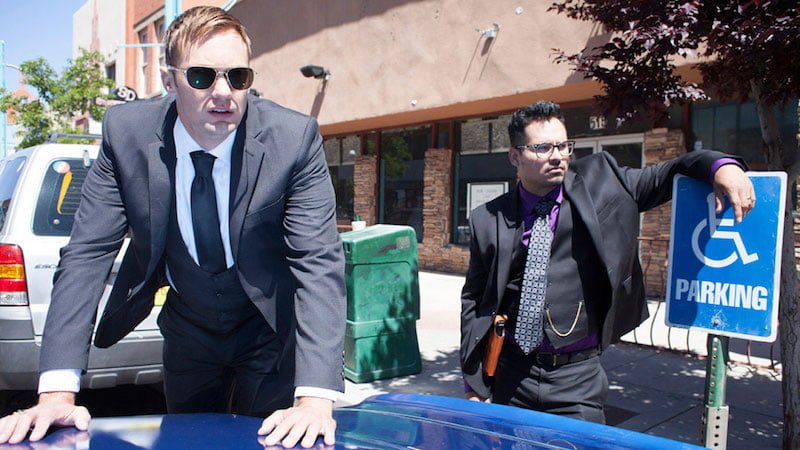 John Michael McDonagh has a knack for bringing genre conventions down to earth. His debut feature, The Guard (2011), twisted the police procedural into scurrilous shapes, while his follow-up, Calvary (2014), took a more tragicomic tack in its exploration of faith and expiation, creating an existential Western which invested the rural west of Ireland with dramatic grandeur, blending the provincial with the profound. For his third feature, McDonagh ventures to New Mexico for a wicked play on the ‘buddy cop’ genre, taking the foul-mouthed register of The Guard and upping the ante considerably into a kind of brutal slapstick which feels like Laurel and Hardy spliced with Abel Ferrara.
John Michael McDonagh has a knack for bringing genre conventions down to earth. His debut feature, The Guard (2011), twisted the police procedural into scurrilous shapes, while his follow-up, Calvary (2014), took a more tragicomic tack in its exploration of faith and expiation, creating an existential Western which invested the rural west of Ireland with dramatic grandeur, blending the provincial with the profound. For his third feature, McDonagh ventures to New Mexico for a wicked play on the ‘buddy cop’ genre, taking the foul-mouthed register of The Guard and upping the ante considerably into a kind of brutal slapstick which feels like Laurel and Hardy spliced with Abel Ferrara.
Like McDonagh’s previous offerings, War on Everyone has an emphasis on characterisation: it is heavy on attitude but light on story coherence and direction. The narrative bagginess that often afflicted The Guard and Calvary was leavened considerably by two masterful central performances from Brendan Gleeson. Equally, it is left to Alexander Skarsgård and Michael Peña as a pair of thoroughly disreputable detectives to keep War on Everyone from collapsing under the weight of its own self-awareness. The plot, such as it is, centres on hard-drinking Glen Campbell enthusiast Terry Monroe (Skarsgård) and cerebral family man Bob Bolaño (Peña), who bribe and strong-arm their way around town before finally meeting their match in the form of corrupt British plutocrat Lord James Mangan (Theo James).
McDonagh’s film is similar to his brother Martin’s In Bruges (2008) and Seven Psychopaths (2012) in its cine-literate, self-reflexive wisecracking and abundant gunplay: it is Tarantino with A-Levels, flitting between philosophical ponderings, pop culture ramblings, and lashings of profanity. But where The Guard and Calvary had an ear for the cadences of its locale, War on Everyone exists in a kind of meta black hole where the leads trot out ‘we are the police’ clichés with a knowing wink and characters utter lines like ‘I’m aware of the cop/informant dialectic’. It is infused with a ’70s aura, which places it in uneasy proximity to The Nice Guys (2016), which for all its narrative shortcomings had charm to spare. War on Everything is a conspicuously mean-spirited affair which squanders its opportunity to deconstruct ‘buddy cop’ conventions in the Black Lives Matter paradigm. Indeed, it seems to revel in the ugly currents currently present in the culture – as Mark Ruffalo’s Inspector David Tosci says in Zodiac (2007) after seeing Dirty Harry (1971), ‘So much for due process…’
None of the blame for the film’s failure lies at the feet of its leads, who strive manfully to rescue the shortcomings in the material. Last seen as a walking six-pack in David Yates’ misfiring The Legend of Tarzan (2016), Skarsgård does a good line in rugged anti-hero. Affecting a Hunter S. Thompson mumble, he evokes the maverick intensity of Mel Gibson in Lethal Weapon (1987) and the loping menace of classic tough guy Sterling Hayden. One of the film’s few bright spots is the presence of an Hispanic actor in a substantial role. Peña has long been an undervalued talent restricted to comedic relief and supporting stereotypes, and his role here seeks to subvert these expectations amidst so much that is reactionary and reductive. He and Skarsgård have great chemistry, but there is no framework to service them and their shtick becomes tiresome after a point. In the supporting roles, David Wilmot steals his scenes as a hapless stooge and Paul Reiser is entertaining as the flustered lieutenant. But the other roles, not so much. James is a poor man’s Rupert Everett as the cartoonish villain – all cut-glass accent and pantomimic sneering – while Caleb Landry Jones does a passable impression of Andrew Robinson’s Zodiac Killer surrogate in Dirty Harry.
No one can accuse McDonagh of not having a distinctive voice. He has made one of the most foul-mouthed films in movie history while also name-checking Conrad, Proudhon and de Beauvoir. But none of this is tethered to anything resembling a substantial or comprehensible plot. McDonagh’s screenplay feels both overcooked and underdeveloped, relying on its battery of politically incorrect jabs at various religions, ethnicities, nationalities, sexualities and disabilities to divert attention from the absence of any direction. War on Everyone never quite achieves the transition from knockabout romp to serious crime film, shooting indiscriminately at a series of easy targets. What we have is a string of sketches interspersed with chases, explosions and shootouts. McDonagh has said that he writes to entertain himself, which is all well and good, but not at the exclusion of the audience. War on Everyone is a stylish mess. The most damning summation comes from the mouths of its own characters, who aver that ‘It starts and ends with the script’ and ‘That shit’s not funny anymore’.
Filed under: Film, TV & Tech

Comments